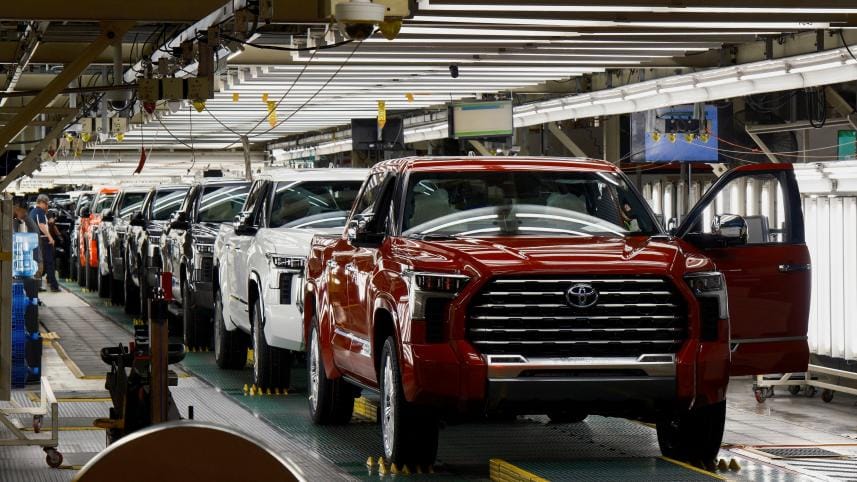Toyota raises annual net profit forecast as chip shortage eases

Japan's Toyota raised its annual net profit forecast to a record high on Tuesday and reported strong sales in all regions in the first three quarters as the global semiconductor shortage eases.
The weak yen is also boosting earnings for the auto titan, which now expects to book a net profit of 4.5 trillion yen ($30 billion) this financial year, up from its previous forecast of 3.95 trillion yen.
Third-quarter net profit soared 86 percent on-year to nearly 1.36 trillion yen, the company said.
Demand is booming for Toyota vehicles, and production has recovered significantly from the semiconductor and supply shortages that have pummelled the auto industry in recent years.
Last week the firm announced record vehicle sales of 11.2 million across its brands in 2023, maintaining its crown as the world's top-selling automaker.
But it is also facing scandals involving rigged engine and safety tests at its subsidiaries, which analysts said could have an impact on its overall performance.
"Sales volume increased in all regions" from April-December 2023, while "profit structure improved as marketing efforts together with cost-reduction efforts overcame soaring materials prices since the Covid-19 pandemic", Toyota said.
"As the semiconductor shortage eases, we have been asking suppliers and dealers for their understanding and cooperation in order to deliver as many vehicles as possible to customers as quickly as possible," it added.
Toyota pioneered hybrid cars with its uber-popular Prius model, and critics say the company has been slow to embrace battery-powered engines, even as demand soars for low-emission vehicles.
In 2023, China overtook Japan as the world's biggest vehicle exporter, according to official data released last week, a change fuelled by the country's dominance in electric cars.
Now Japanese carmakers are playing catch-up, with Toyota aiming to sell 1.5 million EVs annually by 2026 and 3.5 million by 2030.
The company is also hoping to mass-produce solid-state batteries that charge faster than conventional ones and give EVs more range.
Even so, Toyota is unlikely to give up on hybrids, Tatsuo Yoshida, an auto analyst at Bloomberg Intelligence, told AFP ahead of the results.
Aside from the high costs involved, challenges faced by battery-powered cars include "limited range, charging infrastructure, resale values and battery recycling", he said.
An improvement to supply chain problems, pent-up demand and the weak yen are working in Toyota's favour, according to Yoshida.
But "scandals involving subsidiaries like Daihatsu and Hino, as well as Toyota Industries, could potentially affect Toyota's overall performance", he warned.
Last week, board chairman Akio Toyoda also apologised for recent scandals involving rigged engine and safety tests at the subsidiaries.
Toyoda vowed to oversee improvements to recover trust from consumers, saying he was "ashamed" of the situation.



 For all latest news, follow The Daily Star's Google News channel.
For all latest news, follow The Daily Star's Google News channel.
Comments